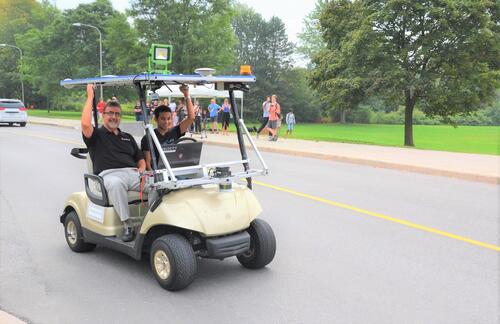
‘Just build things’
Young founder of US $5B trucking company urges Waterloo students to get their hands dirty

Young founder of US $5B trucking company urges Waterloo students to get their hands dirty
By Brian Caldwell Faculty of EngineeringAlex Rodrigues and Brandon Moak, the 20-something founders of an autonomous trucking company now valued at approximately US $5 billion, don’t have to look far for a reminder of their roots.
Hanging inside the front doors of their San Francisco office, a photograph shows a teenaged Rodrigues giving Feridun Hamdullahpur, then president and vice-chancellor of the University of Waterloo, a ride around the Ring Road in a self-driving golf cart.
It was 2015. Rodrigues and Moak, his undergraduate classmate in the mechatronics engineering program, had built the cart – the first autonomous vehicle in Canada – in his parents’ garage.
“It’s the first thing you see once you get in our office – where it all began,” Moak said.

Alex Rodrigues, right, drives Feridun Hamdullahpur around the Ring Road in a self-driving golf cart in 2015. This photo now hangs in the headquarters of Embark Technology Inc. in San Francisco.
Just six years after that photo was taken, Moak and Rodrigues have built newly named Embark Technology Inc. into a company with more than 200 employees and plans for a network of autonomous transport trucks hauling goods faster, cheaper, safer and with less environmental impact.
Embark took a huge step in that direction today when it announced the completion of a merger with Northern Genesis 2, a special purpose acquisition company headed by Waterloo Engineering alumnus Ian Robertson (BASc ’82), to become a public company. It will begin trading on the Nasdaq exchange Thursday with an estimated $5-billion valuation.
Shares held by Rodrigues and Moak, who remain the chief executive and chief technology officers, respectively, make them both worth hundreds of millions of dollars.
The deal also backs the company - founded in 2016 after Rodrigues and Moak left during their second year at Waterloo and hit the road for Silicon Valley with their golf cart in the back of a pickup truck – with about US $300 million to fund commercialization of its software by 2024.
“To be honest, I haven’t really processed that angle of it,” Moak said of his new wealth.
“What we aspire to is a network deployed across the United States hauling freight autonomously every single day and we’ve got a lot of work to do between now and that being a reality. Maybe my day-to-day will change slightly, but I still expect to be head-down working on Embark for quite some time.”
The partners, both 26, say an early decision to focus solely on autonomous trucking, as opposed to autonomous driving in general, was key to their rapid progress as young entrepreneurs.
Embark’s business model envisions large fleets paying per-mile fees for proprietary software enabling their trucks to autonomously drive long distances on major highways. To move trailers into cities via secondary roads, human drivers would still be needed.
The company has already logged well over a million miles in autonomous mode - with backup drivers on board for safety - with its own development fleet and has more than 14,000 reservations for its self-driving software when it becomes commercially available starting in the US sunbelt.
“I think this is transformational technology,” Rodrigues, who built his first robot as an 11-year-old boy growing up in Calgary, told a recent webinar. “It’s what I have dedicated my life to and I want to see it having the maximum impact it can.”
Although the duo didn’t stay in Waterloo long, Moak credits its hands-on lessons and entrepreneurial emphasis with giving him an invaluable foundation to build on.
He was drawn to Waterloo from his hometown of Halifax by its co-op program, and connected with Rodrigues over a mutual passion for “building cool things” when they both lived in a dedicated residence for the Velocity startup incubator.
“I think very, very highly of the model of education Waterloo employs,” Moak said. “Going to Waterloo, doing my first co-op, being in an atmosphere where everyone just wanted to get their hands dirty and build stuff all the time, really accelerated my trajectory.
“My general advice to all Waterloo students is to just build things – big, small, stupid, fun, intelligent. Whatever it is, you learn a lot from it.”
Main photo: Alex Rodrigues, left, and Brandon Moak are co-founders of Embark Technology Inc.

Read more
How Doug Kavanagh’s software engineering degree laid the foundation for a thriving career in patient care

Read more
Upside Robotics secures new funding to accelerate the future of sustainable farming

Read more
Redefining capstone learning by bringing students, faculty and community partners together to tackle real-world challenges
The University of Waterloo acknowledges that much of our work takes place on the traditional territory of the Neutral, Anishinaabeg, and Haudenosaunee peoples. Our main campus is situated on the Haldimand Tract, the land granted to the Six Nations that includes six miles on each side of the Grand River. Our active work toward reconciliation takes place across our campuses through research, learning, teaching, and community building, and is co-ordinated within the Office of Indigenous Relations.